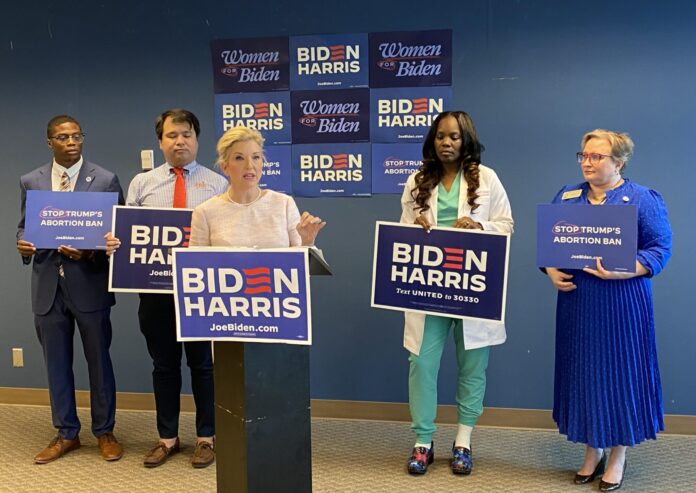
(Georgia Recorder) — Georgia Democrats are warning of a continued threat to reproductive rights after U.S. Senate Republicans blocked an attempt to reinforce Americans’ access to contraception that GOP leaders dismissed as an election-year political stunt.
The Senate proposal failed to advance Wednesday with a 51-39 procedural vote when it needed the support of 60 senators to move forward. Senate Republicans panned the bill as too broad and unnecessary.
But Georgia Democrats speaking at a press conference held Thursday on behalf of the Biden-Harris campaign argue this and other similar proposals are genuine attempts to protect access to care in the wake of the 2022 Supreme Court ruling that overturned Roe v. Wade.
“These threats to our reproductive rights are not merely hypothetical. They are real and immediate,” said state Rep. Marvin Lim, a Norcross Democrat.
This is the first presidential election since the 5-4 ruling that ended federal abortion rights, leaving the issue to the states to decide. Former President Donald Trump’s three Supreme Court nominees were part of the majority.
Trump, who is the presumptive GOP presidential nominee, suggested in April that he might be open to states restricting access to contraceptives before quickly walking back the comments.
“There is so much at stake in this election. I think we know that across the board. But in terms of women, there is more at stake than ever before because it’s not just about even access to abortion or that kind of health care. It is access to contraception,” said former state Sen. Jen Jordan, who stepped down to run for attorney general in 2022.
“Think about it. That’s some serious stuff, folks. And so for anybody who is a woman, loves a woman, which I hope a lot of people do, has children, wants to have children, doesn’t want to have children, doctors, whatever. This impacts every single one of us.”
Comments in a concurring opinion by Supreme Court Associate Justice Clarence Thomas continue to loom over these debates. Thomas wrote that the justices should “reconsider all of this Court’s substantive due process precedents, including Griswold, Lawrence, and Obergefell.”
The 1965 Griswold v. Connecticut case was the first time the court recognized that married couples’ constitutional privacy rights extend to decisions about contraception.
Lim argued that it is an “open question” what contraceptives should continue to be accessible in post-Roe America. He pointed to the morning-after pill as an example of one of the more potentially vulnerable options.
“Because there is legitimate doubt as to what exactly people want to protect, I think all of us should be – at the U.S. level, at the Georgia level, even at the local level – seeking to protect all forms of contraception that have been proven, as all of these methods we talked about have been, to be proven safe,” Lim said.
Lim co-sponsored a bill filed late in this year’s session that would have put protections for contraceptives into state code.
A companion bill filed in the Senate sought to shield access to in-vitro fertilization treatment after a ruling by the Alabama Supreme Court left access in peril there. Georgia Republicans dismissed the bill as unnecessary here, calling the Alabama ruling a quandary specific to that state.
Those bills did not advance this year. Instead, GOP leaders in the House backed a bipartisan resolution on the final day of the session that expressed support for access to IVF treatment, saying there “should be no question that in-vitro fertilization will remain available in the State of Georgia.”
A message seeking comment from the Georgia Republican Party was sent Thursday afternoon.






